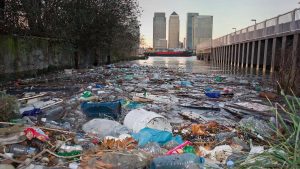From where we are sat in the centre of Bristol or the more rural areas of the Bristol Avon Catchment, we rarely consider how our livelihoods and environments are linked to the sea. But in reality, our everyday actions have a direct impact on the health of our oceans, and a key part of this link is our rivers.
Rivers are a major pathway for plastic waste, washed into rivers from land during heavy rainfall events before flowing into the sea. In fact, it was reported that ‘just 10 rivers carry 90% of the plastic polluting our oceans’. This problem is not limited to developing countries and is ongoing in British waterways. Rivers are also suffering the same issues with plastic waste as we see on ocean awareness programmes such as the fantastic Blue Planet.

Plastic waste in the River Thames (Credit: Steve Taylor ARPS/Alamy Stock Photo)
Not only this, but toxins that run off from land, from urban and agricultural sources, bind to plastics in the ocean. It is now well known that these various sized plastics are ingested by a range of organisms from plankton, to fish and birds and cetaceans. These toxins prefer to bind to fatty layers than plastics so enter the bodies of those that ingest them. In this way, these toxins enter the food chain and accumulate in larger animals such as the fish that we eat, posing a real threat to human health.
So how can you help?
Well, we have the potential to stop ocean waste at its source – by preventing waste from getting into our rivers and therefore into our oceans. BART run a number of riverbank litter picks throughout the year, so keep an eye on our volunteering page to get involved with these. We have also produced a guidance pack to help community groups to run their own litter picks, including risk assessments, blank posters and how to dispose of waste collected that we are happy to share (contact harriet@bristolavonriverstrust.org). There are some other really great organisations out there that are running litter picks in your area, such as local ‘Friends of’ groups and organisations such as Surfers Against Sewage. We are happy to help you find local groups you can get involved with, just get in touch! Or how about starting your own?
However, the best approach is to reduce the amount of single use plastics that we are using, for example using reusable cups, bags and other containers and buying from local shops such as greengrocers where you can purchase loose vegetables that are not in plastic packaging. We love the great Refill Bristol scheme started by City to Sea that is now going national and encourages business owners to put up stickers promoting that they are happy to fill up refillable bottles!
So, in summary, looking after our rivers is a fundamental step in protecting our oceans!






